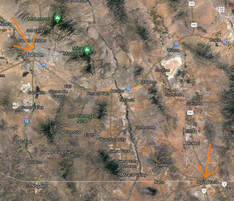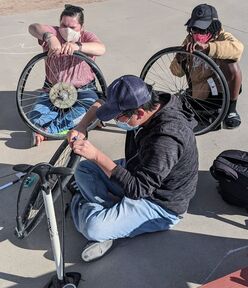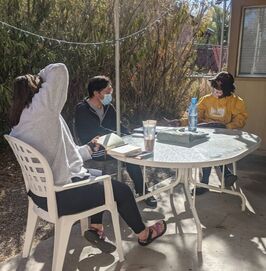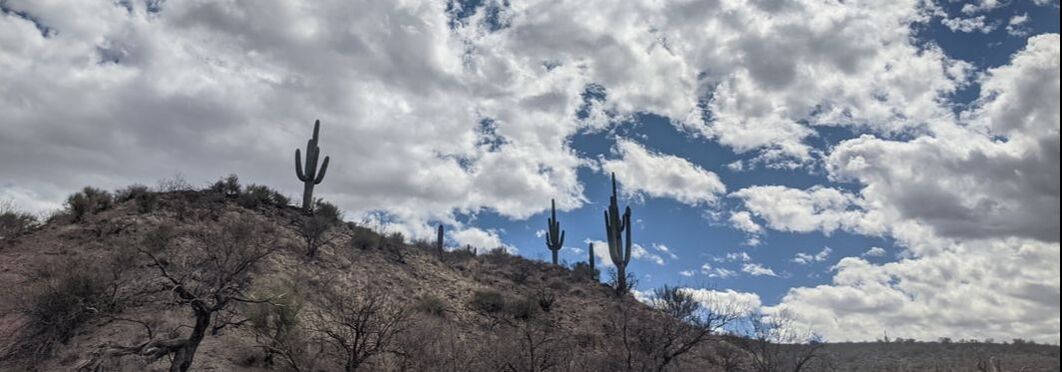 Tucson and Agua Prieta are about 120 miles apart. Tucson is about 65 miles north of where the Mexico/U.S. border is drawn across indigenous land. This national border, which may seem so firm, was finalized less than 200 years ago in 1853.
Tucson and Agua Prieta are about 120 miles apart. Tucson is about 65 miles north of where the Mexico/U.S. border is drawn across indigenous land. This national border, which may seem so firm, was finalized less than 200 years ago in 1853.
As you consider service with SWERV Tucson, we want to share some of the big ideas that we think about in both planning for and living through this program. This chunk of writing gives you an idea of the big ideas that are running through the work we do together in this program location. (Note: Much of this framing is shared with Tucson Borderlands YAV; the two programs will run together in 2021-2022.)
SWERV Tucson is a binational, borderlands service site. We're binational because we place volunteers both in Tucson, AZ in the United States, and in Agua Prieta, Sonora in Mexico. Volunteers in both places connect with their local communities and with each other, to build community across the border.
We include "borderlands" in our site description to reflect the reality of this context, the history of this region, and the experience of some of our neighbors. Volunteers at this site live and work in the borderlands: the 100-mile swath of the United States that the ACLU calls "The Constitution Free Zone;" land that used to be part of Mexico; land where some families who have lived here for generations experience as a real part of their family history, not just a slogan, "We didn't cross the border, the border crossed us."
The borderlands has a history of colonization, including Spanish missions and United Statesian military incursions. We know that as a site we are occupying Tohono O'odham and Pascua Yaqui land when we're in Tucson, and Ópata and Apache land when we're in Agua Prieta. Volunteers arrive here as migrants, as part of a program associated with a Christian church which has a long history of being a tool of empire building.
Both Agua Prieta and Tucson are located in the Sonoran Desert. We hope that volunteers will engage with their surroundings, both the human community and the natural world. We are living in a time of climate chaos — climate change isn't something that will happen one day, but it's happening right now. Some of the people traveling through these borderlands are climate refugees.
We invite SWERV participants to struggle with these realities, to lean in to the discomfort and let these histories impact them. SWERV Tucson is looking for volunteers who are flexible, curious, and open to having their assumptions challenged by what they encounter here. During the service year we'll ask each other, "What does it mean to be associated with an institution (the Christian church) that has a history of colonization, and to try to do things differently? How can we be truly antiracist in our volunteer service? How can we care for each other and ourselves while we learn from the experts who have lived here for years? How will you let yourself be transformed by this experience?" SWERV Tucson isn't here to supply answers, but to hold space for each volunteer's personal and community journey into whatever questions come up. Let's learn, explore, and find different ways together!
SWERV Tucson is a binational, borderlands service site. We're binational because we place volunteers both in Tucson, AZ in the United States, and in Agua Prieta, Sonora in Mexico. Volunteers in both places connect with their local communities and with each other, to build community across the border.
We include "borderlands" in our site description to reflect the reality of this context, the history of this region, and the experience of some of our neighbors. Volunteers at this site live and work in the borderlands: the 100-mile swath of the United States that the ACLU calls "The Constitution Free Zone;" land that used to be part of Mexico; land where some families who have lived here for generations experience as a real part of their family history, not just a slogan, "We didn't cross the border, the border crossed us."
The borderlands has a history of colonization, including Spanish missions and United Statesian military incursions. We know that as a site we are occupying Tohono O'odham and Pascua Yaqui land when we're in Tucson, and Ópata and Apache land when we're in Agua Prieta. Volunteers arrive here as migrants, as part of a program associated with a Christian church which has a long history of being a tool of empire building.
Both Agua Prieta and Tucson are located in the Sonoran Desert. We hope that volunteers will engage with their surroundings, both the human community and the natural world. We are living in a time of climate chaos — climate change isn't something that will happen one day, but it's happening right now. Some of the people traveling through these borderlands are climate refugees.
We invite SWERV participants to struggle with these realities, to lean in to the discomfort and let these histories impact them. SWERV Tucson is looking for volunteers who are flexible, curious, and open to having their assumptions challenged by what they encounter here. During the service year we'll ask each other, "What does it mean to be associated with an institution (the Christian church) that has a history of colonization, and to try to do things differently? How can we be truly antiracist in our volunteer service? How can we care for each other and ourselves while we learn from the experts who have lived here for years? How will you let yourself be transformed by this experience?" SWERV Tucson isn't here to supply answers, but to hold space for each volunteer's personal and community journey into whatever questions come up. Let's learn, explore, and find different ways together!

Key program logistics:
- Housing: Volunteers in Agua Prieta live in a furnished duplex apartment owned by the local partner there, sharing space with other volunteers interning with Frontera de Cristo (including volunteers from both Mexico and the U.S.). Volunteers there share expenses and navigate community within and beyond the house. Volunteers in Tucson live in a furnished 3 bedroom, 2 bath house rented by the TBYAV program, and work together to pay utility bills (gas, electric, water, internet) out of their shared stipend. Volunteers often share bedrooms, depending on the number of volunteers in a cohort.
- Living expenses: Volunteers in Tucson receive one check for their household living expenses, and are asked to share resources to make sure everyone has enough. This means sharing the living expense stipend based on communication and collaboration, rather than just giving everyone an equal amount of money. Folks in Agua Prieta receive a check separately to manage their finances there.
- Transportation: Volunteers are asked to use bicycles as their primary form of transportation, if they are able. Using bikes allows us to minimize our use of resources (both in terms of the money it takes to maintain an automobile and using less gasoline), to connect more easily with our neighbors (it's easier to say hi from a bike than from inside a car), and to get to know this place in a more intimate way. If biking isn't possible for you, public transportation is a good option that works instead, and serves the same goals! There is a program automobile available for occasional community use.
- Bicycles: Every volunteer is provided a bicycle when you arrive in Tucson (or, if you have a bike you want to use during your year, the program will pay to ship it to Tucson). The volunteer group practices biking together during local orientation to get a sense of how to plan a safe route and how to navigate Tucson by bike. We'll also make sure everyone knows how to patch a flat tire, because everything in the desert has spikes or thorns!
- Church connections: This program is a ministry partner of the Presbytery de Cristo rather than a single specific church in the area. This means that we get to connect with many different churches during the course of a service year — sometimes through invitations for the volunteers to share stories with a congregation or help lead worship. For volunteers, this also means that we ask you to consider what kind of spiritual community feeds your spirit, and to connect with that during your year of service! For some folks that means regular worship and other participation with a Presbyterian church; for others it might mean joining the local Quaker meeting, a non-denominational fellowship, or other faith community.
- Community partners & partner placement process: We call our work placements "community partners," to emphasize that volunteers serve in partnership with local leaders (and that the program is in partnership with the organizations hosting volunteers). Folks in Tucson generally work 32-36 hours/week with their partner organization, usually Monday through Thursday. Fridays are set aside for the work of intentional community, and dedicated to community/program activities. To place volunteers with their community partner organization for the year, we continue in mutual discernment: you'll identify 1-2 partners you're interested in, interview with the supervisor(s) there, and then talk through your feedback and sense of call with the SWERV Tucson director. You can find the full list of potential partner organizations on the TBYAV Community Partner page.

Volunteering during a global pandemic:
Barring unforeseen disasters, SWERV will be running in-person for the 2021-2022 program year. The local Board of Directors and our partners in the Presbytery worked hard throughout 2020 to adapt to safe operating under pandemic conditions.
We know that we can never fully guarantee anyone's safety in this world — but we are confident that we have the capacity to host volunteers with the highest level safety possible in this uncertain world. Feel free to review the current Covid safety protocol that all volunteers are asked to commit to. This protocol is reviewed monthly by the SWERV Steering Committee and update as-needed. Please note that when volunteers arrive in Tucson, the cohort will be quarantined for 10 days (or whatever the CDC guideline is at that time) in separate facilities (in 2020 for SWERV, this meant staying in RVs parked in the same parking lot). Please also note that this is subject to change depending on vaccinations and other adaptations in virus management.
Most of the pandemic situation will probably change a lot between this moment and when you arrive in Tucson. Adaptability and good communication are key. If we discern together that Tucson is a good place for you to serve, we'll work to navigate the evolving reality of this pandemic together.
Barring unforeseen disasters, SWERV will be running in-person for the 2021-2022 program year. The local Board of Directors and our partners in the Presbytery worked hard throughout 2020 to adapt to safe operating under pandemic conditions.
We know that we can never fully guarantee anyone's safety in this world — but we are confident that we have the capacity to host volunteers with the highest level safety possible in this uncertain world. Feel free to review the current Covid safety protocol that all volunteers are asked to commit to. This protocol is reviewed monthly by the SWERV Steering Committee and update as-needed. Please note that when volunteers arrive in Tucson, the cohort will be quarantined for 10 days (or whatever the CDC guideline is at that time) in separate facilities (in 2020 for SWERV, this meant staying in RVs parked in the same parking lot). Please also note that this is subject to change depending on vaccinations and other adaptations in virus management.
Most of the pandemic situation will probably change a lot between this moment and when you arrive in Tucson. Adaptability and good communication are key. If we discern together that Tucson is a good place for you to serve, we'll work to navigate the evolving reality of this pandemic together.

